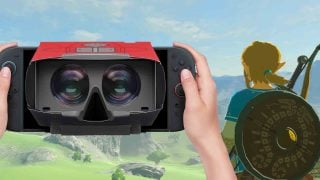The Super Smash Bros. series is one of Nintendo’s most beloved properties, with Super Smash Bros. Ultimate being the best-selling fighting game of all time. The games have garnered a huge following over the years from both casual and hardcore players. However, there is a sect of professional Smash players that prefer the speed and insane combo potential of the GameCube’s Super Smash Bros. Melee over the newer iterations, and as Nintendo seems to have no intention to rerelease Melee, many indie games have risen to fill in the gap.
Rivals of Aether is a longtime veteran of the Smash scene, having entered early access on Steam in 2015. Since then, the game has seen numerous updates, balance changes, and character additions. Now, the Definitive Edition has made its way to Nintendo’s very own platform, where Super Smash Bros. Ultimate reigns supreme. It’s a good thing, then, that Rivals of Aether manages to differentiate itself enough from its initial inspiration to provide a thrilling — and challenging — experience all its own.
Shining on its own
Rivals of Aether plays much like the Smash games, with characters equipped with normal attacks that change with directional inputs, a couple special moves, and a double jump. If you’ve played a Smash game before, you will instantly feel right at home.

Where this game diverges is in the details. Rivals of Aether is focused much more on combos and offense compared to the most recent Smash titles. The biggest change is the removal of shields and grabs. Characters can still roll side to side and dodge in the air, but the shield has been replaced with a parry that will leave the opponent stunned but requires precise timing. This means that movement and counter attacks are key, since you can’t just hold the shield button if you know an attack is coming. When you do get hit, you will find that the hitstun — that is, the time your character spends reacting to a hit and not being able to attack or anything — is much greater than Smash Ultimate.
Juggling your enemy is the primary way to build damage on your opponent in this game, as no one hit does a huge amount of damage. You’ll want to follow up your down tilt with a neutral air or a dash attack and keep the combo going. When you are being attacked, it can feel a bit disheartening to be mercilessly bounced around for what could feel like longer than you should be. This places greater importance on directional influence, or DI, as a way to move your character in unexpected ways to break combos or save yourself from going offscreen. It has taken some time to get used to the sometimes brutal hitstun as I watch my beloved Shovel Knight plummet halfway across the screen, but that can also be chalked up to inexperience. If I had just DI’d correctly, I probably would have stayed onstage. I know that I miss shields and grabs, because I tend to be a defensive player, but I eventually got the hang of the game’s flow before too long.

Overall, the fighting system in Rivals of Aether is far better and tighter than any other indie platform fighter I’ve played. Characters feel weightier and have faster air movement. This was designed to be familiar to Melee players, and it shows. This may be a pro or con depending on your interests, but Rivals of Aether does not lend itself to casual party matches with friends as well as Smash. It’s more competitive, a bit harder to pick up, and is more unforgiving when it comes to mistakes and skill gaps. And for some, that’s just what they’re looking for.
A Lion eat Weasel eat Plant Wolf world
The roster in Rivals of Aether consists of twelve original characters, all of which being anthropomorphic animals divided into the elements of fire, air, water, and earth, and two guest characters. Each character fills a fighting game archetype, so you’re bound to find at least one that clicks. Some of the characters borrow heavily from a Smash Bros. counterpart. Absa, the electric goat, has Ness’s jump, Zelda’s side special and aerials, and Pikachu’s up special, for instance. While characters undeniably have at least some inspiration from an existing character, I do not mark that against the game, as they still manage to make each character feel unique and fresh, despite their obvious origins. The two guest characters, meanwhile, are Shovel Knight and Ori from Ori and the Blind Forest. I have to give a special shoutout to Shovel Knight. He quickly became my favorite character, and is so true to his origins that he feels like he stepped right out of his own game.

Each character has their own sort of passive system that changes how they play. Zetterburn the fire lion can burn players and then consume that fire to power up his strong attacks, while Shovel Knight knocks gold and jewels out of his opponents and can use his haul to buy upgrades mid-match! I really enjoyed the mindset of affecting either the environment or the state of the players with each character rather than everyone just having punches and one projectile. Characters in Rivals require much more knowledge than in Smash, and it can be quite fun to dig into the cast and see what makes them tick.
Pretty punching paws
Rivals of Aether made the wise decision to go with pixel art sprites that makes it stand out from other indie platform fighters. The characters all look colorful and vibrant and easily stand out amidst the frantic action. The music is also quite good, and the Shovel Knight remixes are particularly rocking.
As far as modes, you have a single player mode with stories for each character and local fights for up to four players. Also included is an in-depth tutorial that teaches concepts like DI and tech rolls that I found quite helpful. There is also a local mode called Abyss that has players equip buffs to their character for battles against endless CPUs or versus fights. There is also a delightful tetherball mode that has big Lethal League energy. One noteably fantastic addition is a beefy replay system that lets you see things like hitboxes, which should be included in all fighting games.

The online suite consists of friendly matches, casual games, and a ranked mode. The online matches utilize a strike/ban stage selection system similar to what you find in a Smash Bros. tournament that I think should be implemented in most fighting games.
The online is where the game runs into its biggest hurdle, however. When I first started playing, most matches ran extremely slow, even with low ping. A patch was released shortly after that alleviated this to a decent degree, but I still sometimes find myself in matches with harsh slowdown. It can be frustrating to be stuck in a best of 3 ranked match when the game is running poorly, but you don’t want to quit and lose ranking points. I have also had the game crash twice, which is a problem, of course.
I do have to give no small amount of credit to developer Dan Fornace, though. He posted a lengthy blog post about the game’s development, the numerous issues with porting to Switch, and the struggle to make a tight netcode in an independently made game. It’s well worth reading. The online still has some hiccups, and I hope the crashes get sorted out, but devs take note: transparency goes a very, very long way toward understanding when it comes to a game’s technical issues.
Fast and Furry-ous
Rivals of Aether wears its inspirations proudly, offering a more competitive alternative to Super Smash Bros. The presentation is vibrant and exciting, and the characters are unique and deep, and though the gameplay is challenging and rewarding in alternating measures, technical issues might hamper your experience. That being said, the game could well be worth your time. If you are a fan of Melee, you should absolutely check the game out. If you like the other Smash games and consider yourself mildly competitive, you will still probably enjoy the game, and will definitely find yourself learning new tactics and skills for the genre as a whole. If you can look past the hiccups, or if the dev keeps putting out patches, then this game will be a blast for you and your friends for years to come.
Leave a Comment
System: Nintendo Switch
Release Date: September 24, 2020
Categories: Fighting
Publisher: Dan Fornace
Developer: Dan Fornace


